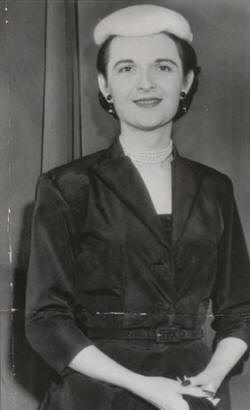

Queer Places:
SHO-BAR, 228 Bourbon St, New Orleans, LA 70130
Fairview Cemetery
Dyersburg, Dyer County, Tennessee, USA
 Charlotte Frances McLeod, formerly Charlie Earnest McLeod (February 26, 1925 - September
16, 2007[1]), was the second American woman to travel to Denmark and undergo a sex change operation. Before her transition, McLeod served in the army from 1948-1949. She was discharged from the Army for minor medical reasons.[2]
Charlotte Frances McLeod, formerly Charlie Earnest McLeod (February 26, 1925 - September
16, 2007[1]), was the second American woman to travel to Denmark and undergo a sex change operation. Before her transition, McLeod served in the army from 1948-1949. She was discharged from the Army for minor medical reasons.[2]
McLeod was originally from New Orleans, Louisiana, but also lived in Miami and Tennessee at different points throughout her life. McLeod's father recalled that she rarely engaged in sports or other games with boys.[3] McLeod was in the army from 1948-1949 and was discharged for minor medical reasons. When asked about why she left, McLeod stated: "Everyone could see that I was no soldier, and that it was all a mistake.”[4] McLeod was unable to get the plastic surgery in America she wanted. Instead, American doctors attempted to change her transgender identity: "I’ve never been a boy—not in my mind. American doctors offered to make me more of a man, but could never give me a man’s mind”[5] McLeod commented several times on the dire emotional state she was in due to her inability to be the gender she felt she truly was. During her time in America she felt suicidal due to her inability to receive surgery in America, stating: “I was treated neither as male or female—more as a nonentity…I was miserable and I wanted to die.”[6]
McLeod, who had been living in Dyersburg, Tennessee, traveled to Denmark Copenhagen, Denmark at age 28, in the years 1953-1954, for the plastic surgery procedures that would allow her to transition from male to female. McLeod used an inheritance from a great aunt to pay for travel. At that time, under Danish law, the operation could only be performed on Scandinavians. However, McLeod still underwent a sex-change surgery that was performed by professors and surgeons free of charge. McLeod's surgery was cited as being rather dangerous and unconventional. However, McLeod's intentions to return home a woman did not falter: “The thought of having come all this way in vain and return as the Charlie I hated was unbearable. So I managed to have the first operation made unofficially. It happened on a kitchen table at midnight and that’s all I want to say about that, but the operation almost killed me.”[6]
McLeod's father, Charles McLeod Sr., worked in insurance. He and McLeod's mother divorced and were each remarried. Charles had two other daughters with his second wife. Originally, Charles was against McLeod's operation because American doctors had warned him it would be dangerous for McLeod's health. When he learned that a Memphis psychiatrist was giving her hormones, he walked out of the office in disgust.[3] Because of the threat that surgery would have to McLeod's life, Charles told McLeod that he would not help her.[2] However, after McLeod returned, her father stated: “I was opposed to the operation, but now that it’s over, I’m ready to support Charlotte as my daughter.”
McLeod performed a one-woman show once a week at SHO-BAR at 228 Bourbon Street in New Orleans, Louisiana. It was a nine-act show where she discussed different aspects of her transition.[9] She also appeared as a Comedienne in Green Village Bistro in Boston in 1954.[10] McLeod did not have a strong desire for this kind of career, but continued to work in entertainment in order to make enough money to live a normal life. She was quoted telling The San Francisco Examiner that: “She doesn’t look forward to night club work, but thinks it necessary to pay bills. She said she is looking forward to married life and a home of her own.”[7]
McLeod was documented working as a secretary for six weeks, as well as demonstrating cosmetics at a Miami Beach shop.[11]
McLeod was married at age 34 in Miami, Florida.[15] McLeod's husband, Ralph H. Heidal, was from New York and was 36 years old when he married McLeod. The couple were married on October 11th, 1959.[11]
McLeod published an autobiography discussing her life and her transition in Mr. Magazine. In her autobiography she discussed issues such as the distinction between homosexuals and drag queens. She also displayed a dislike towards New Orleans gay counterculture, stating: “I was appalled at their insincerity, insecurity, and promiscuity practiced among them. I did feel a great sympathy for many of these young men and women who I met, but I could find no peace of mind among them.” [7]
My published books: